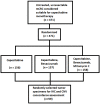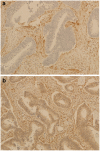Can we accurately report PTEN status in advanced colorectal cancer?
- PMID: 24564252
- PMCID: PMC3941793
- DOI: 10.1186/1471-2407-14-128
Can we accurately report PTEN status in advanced colorectal cancer?
Abstract
Background: Loss of phosphatase and tensin homologue (PTEN) function evaluated by loss of PTEN protein expression on immunohistochemistry (IHC) has been reported as both prognostic in metastatic colorectal cancer and predictive of response to anti-EGFR monoclonal antibodies although results remain uncertain. Difficulties in the methodological assessment of PTEN are likely to be a major contributor to recent conflicting results.
Methods: We assessed loss of PTEN function in 51 colorectal cancer specimens using Taqman® copy number variation (CNV) and IHC. Two blinded pathologists performed independent IHC assessment on each specimen and inter-observer variability of IHC assessment and concordance of IHC versus Taqman® CNV was assessed.
Results: Concordance between pathologists (PTEN loss vs no loss) on IHC assessment was 37/51 (73%). In specimens with concordant IHC assessment, concordance between IHC and Taqman® copy number in PTEN loss assessment was 25/37 (68%).
Conclusion: Assessment PTEN loss in colorectal cancer is limited by the inter-observer variability of IHC, and discordance of CNV with loss of protein expression. An understanding of the genetic mechanisms of PTEN loss and implementation of improved and standardized methodologies of PTEN assessment are required to clarify the role of PTEN as a biomarker in colorectal cancer.
Figures
References
-
- Kopetz S, Chang GJ, Overman MJ, Eng C, Sargent DJ, Larson DW, Grothey A, Vauthey JN, Nagorney DM, McWilliams RR. Improved survival in metastatic colorectal cancer is associated with adoption of hepatic resection and improved chemotherapy. J Clin Oncol. 2009;27(22):3677–3683. doi: 10.1200/JCO.2008.20.5278. - DOI - PMC - PubMed
-
- Amado RG, Wolf M, Peeters M, Van Cutsem E, Siena S, Freeman DJ, Juan T, Sikorski R, Suggs S, Radinsky R, Patterson SD, Change DD. Wild-type KRAS is required for panitumumab efficacy in patients with metastatic colorectal cancer. J Clin Oncol. 2008;26(10):1626–1634. doi: 10.1200/JCO.2007.14.7116. - DOI - PubMed
-
- Karapetis CS, Khambata-Ford S, Jonker DJ, O’Callaghan CJ, Tu D, Tebbutt NC, Simes RJ, Chalchal H, Shapiro JD, Robitaille S, Price TJ, Shephard L, Au HJ, Langer C, Moore MJ, Zalcberg JR. K-ras mutations and benefit from cetuximab in advanced colorectal cancer. N Engl J Med. 2008;359(17):1757–1765. doi: 10.1056/NEJMoa0804385. - DOI - PubMed
-
- Cancer incidence in five continents. IARC Sci Publ. 1987;Volume V(88):1–970. - PubMed
-
- Douillard JY, Oliner KS, Siena S, Tabernero J, Burkes R, Barugel M, Humblet Y, Bodoky G, Cunningham D, Jassem J, Rivera F, Kocakova I, Ruff P, Blasinska-Morawiec M, Smakal M, Canon JL, Rother M, Williams R, Rong A, Wiezorek J, Sidhu R, Patterson SD. Panitumumab-FOLFOX4 treatment and RAS mutations in colorectal cancer. N Engl J Med. 2013;369(11):1023–1034. doi: 10.1056/NEJMoa1305275. - DOI - PubMed
Publication types
MeSH terms
Substances
LinkOut - more resources
Full Text Sources
Other Literature Sources
Medical
Research Materials
Miscellaneous



